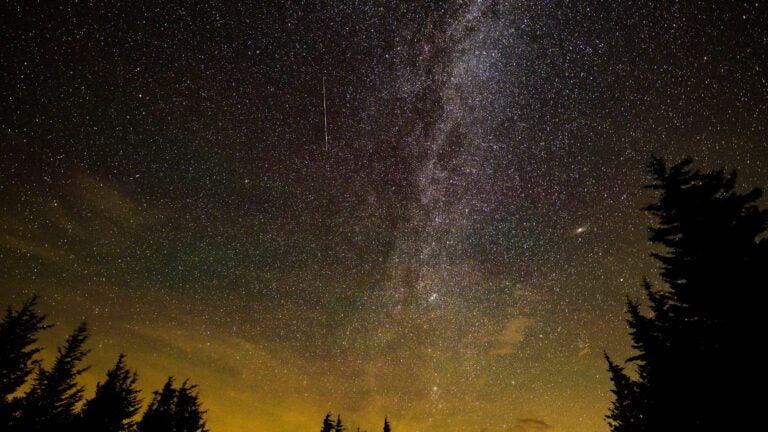Weather
One of the most popular meteor showers of the year is a true stargazing marvel.
Beach days, bike rides and baseball games are all part of the magic of summer, but these summer nights bring something equally special. The sound of crickets and cicadas and even the occasional owl provide a noisy backdrop to the warmth and humidity that is a July and August evening.
My summer job during college was working at an overnight camp in Bridgton, Maine and one of the favorite activities of every August was to take the kids out for some stargazing, specifically viewing the Perseid meteor shower.
Gathering up dozens of school-age kids after evening activity, with blankets and water bottles and flashlights and heading up to the open expanse of the baseball field was an annual ritual. Some years clouds and even showers would prevent us from seeing the meteors, but most years the show was worth the effort. Hearing the “Oohs” and “Aaahs” from across the darkness as a meteor streaked across the sky and kids echoing “Did you see it?” or “Where was it?” is part of my summer memory.
Back then, even the occasional satellite would be mixed into the backdrop of the Big Dipper and perhaps a setting crescent Moon. Years later I have still had former campers mention the enjoyment they remember on those warm summer nights. The point here is that the Perseid meteor shower is an annual memory-making phenomena that should be viewed and shared whenever possible.
When will the Perseid showers peak?
This year the Perseids will peak in the early morning hours of Sunday, Aug. 11 and again on Monday, Aug. 12 and perhaps extending into Tuesday morning. The Perseid meteor shower ramps up to a peak later this weekend and then quickly falls off. On a good year there can be up to 100 meteors crossing the sky and the darker the backdrop the better chance you have of seeing more of them. Even in the light of the city the brightest meteors can provide a brief showstopper.
The Perseids themselves are the debris from the comet Swift-Tuttle and actually started showing up in our night sky back in July. They continue through the rest of the month, slowing rapidly after that peak coming up this weekend.
Best Perseid viewing times
The Perseids are best viewed in the early morning, pre-dawn hours but can be observed as early as 10 p.m. or 11 p.m. if you don’t want to stay up too late or get up super early. There is nothing magical about how to view them. Just find a dark spot, let your eyes adjust and look up. A blanket or comfortable chair makes it easier so your neck doesn’t become stiff while viewing.
Moonlight can be an issue, but this year the moon will set around midnight leaving the second half of the night dark and ideal for viewing conditions.
Of course, cloud cover negates any of this. This year, we are watching the remnants of Debby, which will bring a few showers Friday perhaps lingering into Saturday. The good news is that the clouds should clear for the early-morning hours of Sunday and continue into Monday.
There are actually two other active meteor showers occurring right now, according to the American Meteor Society. They are the Southern Delta Aquariids and the Alpha Capricornids. The first of these is best seen in the Southern Hemisphere, but we can get a couple of meteors in the southern part of the sky. The Alpha Capricornids peaked back in July but again they still can provide a couple of added meteors in the night sky.
Summer fun need not end when the sun goes down, this weekend take an opportunity to head outside and check out one of the best shows nature has to offer.
Daily Local Weather Forecast
-
Today
August 11Intermittent clouds83°
66° -
Mon
August 12Intermittent clouds79°
64° -
Tue
August 13Intermittent clouds80°
68° -
Wed
August 14 -
Thu
August 15 -
Fri
August 16Intermittent clouds80°
67° -
Sat
August 17












